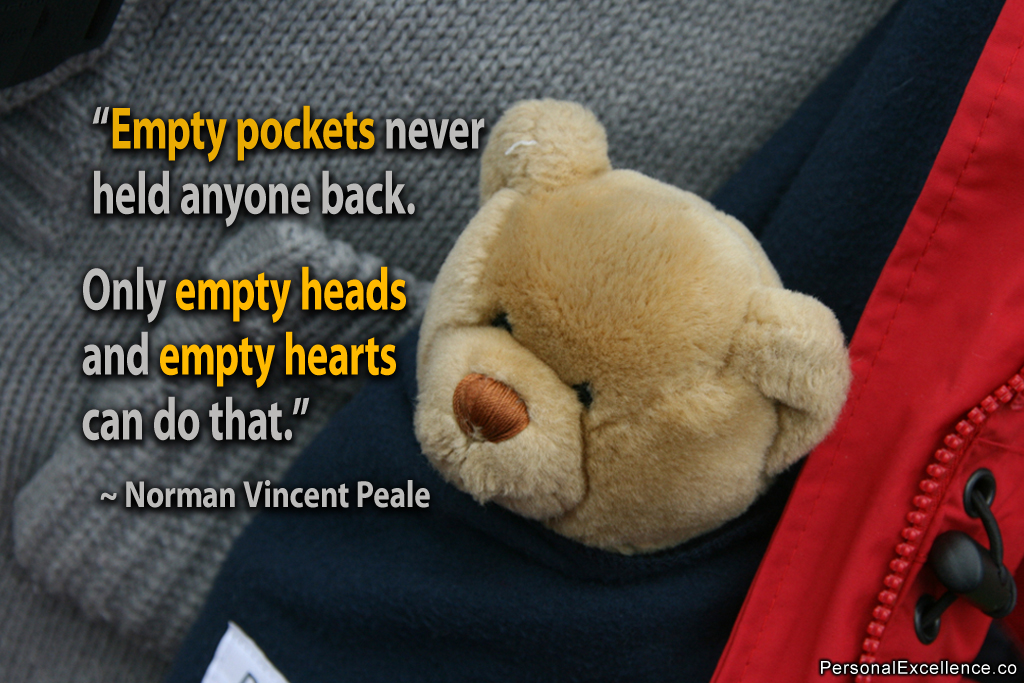
“Dear Celes, all my life, I have struggled with patience. Now as I am getting older and having more experiences in my life, I am finding that I desperately need patience. What can I do to gain patience?” — Cindy
How does one change from being an impatient person to a naturally patient one?
Impatience: An Effect, Not a Cause
The first thing is to realize that patience, like other traits you have, is simply the amalgamation of your underlying beliefs, which are the result of your upbringing or past encounters. This means that you’re not impatient because “that’s just how you are” or “that’s what you were born with.” You are impatient because of certain beliefs you have about yourself and the world.
This is something that participants of Be a Better Me in 30 Days realized. During the first week, they spent three full days (Days 2 to 4) analyzing their undesired traits, peeling the layers of their personalities, and weeding out the reasons as to why they are who they are today. Many of them discovered the fundamental reasons behind their undesired traits—tracing back to as early as their childhoods. These root causes were the very things making them exhibit those undesired traits again, and again, and again, despite their continuous efforts not to behave that way.
Addressing impatience using external approaches like enforcing a patient persona, affirmations, and regulating breathing can be helpful, but only to a limited extent since they do not tackle the root cause. It is more important that you understand the root cause of your impatience and tackle it from inside out, which would create a permanent change in your behavior.
Root Cause of Impatience
So, what causes impatience then?
What Impatience Is
To understand that, we have to first understand what impatience is. According to Dictionary.com, impatience means a lack of patience; restlessness; an intolerance of anything that thwarts, delays, or hinders.
An impatient person never wants to wait for others, or does so with great reluctance. An impatient person feels angsty when things do not go to plan. An impatient person usually feels a great sense of urgency to get things over with and to move on to the next thing, the next task, the next place, the next stop. He/she usually has little regard or interest in what’s going on at this moment in time, because in his/her mind, he/she is already thinking about what he/she has to do next.
As you can see, an impatient person is someone who often feels a great deal of urgency, internal pressure, and internal stress. It’s as if he/she is trying to rush somewhere, or has something that needs to be completed ASAP.
But why? Why does the impatient person feel so much urgency, more so than others? What’s causing it? What exactly is this rush for?
My Experience with Impatience
Perhaps what might help is if I share my experience with impatience.
I used to be a highly impatient person. I would feel annoyed whenever people got in my way. I could never stand to wait more than a few minutes for a bus before feeling irritated at how long it was taking. If things ever progressed slower than expected, I would feel annoyed and irritated. Thoughts like “Why is this so slow?”, “Why can’t this be faster?” or “What’s next?” are very familiar to me.
The funny thing was, I was never aware of my impatience until a year ago. It’s sort of like you don’t know what you’re in the middle of until you take a step back to look at things. Before, I always thought my (impatient) reactions were normal, knee-jerk reactions that anyone would have when caught in the same situation. It was only when I paused and reflected on my thoughts and behavior that I realized I was, in fact, quite the impatient person.
When I dug into my impatience, my answers opened my eyes. I asked myself, point blank: “Why am I always in such a rush?” Turned out that I had been so fixated on reaching a certain end vision, a certain end goal, for my future that I had totally missed living in the present.
When I dug deeper, I realized this fixation (with the future) was due to an innate unhappiness with myself. I had always had a subconscious belief that I was not good enough. In my mind, I thought that if I were to work on changing myself, achieving bigger visions, and accomplishing more goals, I would finally be content and happy. Hence, I kept projecting to the future, using it as my source of salvation.
Did that work though? Not in the way I had imagined. Whenever I achieved my goals, I would feel happy for that moment. However, it would be a matter of time before I thought, “What’s next?”, and got back into that impatient personality. I was constantly in a rush, trying to get from one place (be it a mental vision or a physical place) to the next. I was driven to keep going, keep moving, so as to achieve this elusive end vision where I would finally be happy one day.
Unhappiness with Self -> Projecting as Impatience with Others and the World
Do you see the problem here? The problem wasn’t that I had not achieved my ultimate end goal yet. There is never going to be an end to my goals or visions because there is always room to grow; room to be better. The problem wasn’t my desire to set goals either, for the desire for betterment is part and parcel of being a human. There is nothing worse than being a man with no vision or dreams.
The problem here was (a) my inherent unhappiness with myself and (b) my belief that I had to get somewhere before I could be happy and before I could be considered good enough. I kept thinking that there was something wrong with me and there was something that had to be fixed, which led me to keep looking forward to the future to address this gap.
Was that true though? No! There wasn’t anything wrong with me; neither was there anything wrong with my present moment! My belief that there was something wrong was a flawed belief that had set me on a loop of feeling dissatisfied, trying to work on my areas of dissatisfaction, and feeling dissatisfied yet again even when those areas were addressed. It was a flawed belief that created this endless urge to always hurry, act faster, stop being a slow poke, and get moving, so I could get on to the next big thing.
This was precisely why almost every single thing would get on my nerves, because each little thing—be it the bus being late, to the copier machine being jammed—would be something that stood in my way of achieving my end vision, which in turn stood in my way of becoming a more desirable, less hateable, person. All these little things were standing in my way of achieving my happiness. My angst at the external world was really due to my angst at the thought that I had to spend one more second being my present self (whom I hated).
What finally resolved my impatience was when I addressed my self-limiting beliefs about myself. Why I (constantly) felt that I was good enough. Why I hated myself so. When I did that, the feelings of impatience melted away like water rolling off my skin. I was impatient no more.
(The topic of self-hate and how to address it is a separate topic for a separate day.)
Impatience: An Emotion That Has No Place in Your Heart
The root cause of my impatience might not be the same as the root cause of your impatience. I merely shared my story as an example that impatience is really an effect and not a cause to be tackled.
While it’s natural to look forward to the future and want to achieve your goals as soon as possible, there is definitely something amiss when this desire repeatedly manifests itself as a constant feeling of impatience, a source of self-pressure (in an unhealthy way), and an annoyance at things that stand in your way.
These are negative, tension-filled, and fear-based emotions that have no place in our lives. Their presence usually suggests incongruent, disempowering beliefs which should no sooner be corrected.
Know that one can desire to achieve a better future and still be at peace with the present moment. They are not mutually exclusive from each other.
I shall now share with you a simple, 15-minute-long exercise to dig into the underlying cause of your impatience. If you often experience bouts of impatience or if you are impatient most of the time, use this exercise to discover the root cause behind this undesired trait.
Exercise To Uncover Your Impatience (15 Minutes)
Grab a piece of pen and paper or fire up your favorite word processor. Get ready to type.
- Think about recent incidences where you exhibited impatient behavior.
- Ask yourself: “Why am I so impatient?“. Write everything that comes to mind.
- Go deeper into your answers by challenging them. Ask, “Why?” or ask follow-up questions to continue the thread of thought.
- Repeat #3 until you get to the bottom of the issue.
(Read How to Create Real Change In Life: Address Root Cause vs. Effects for more on how to get to the root cause vs. the effect of an issue.)
Example #1
Take for example, a guy who is constantly snappy to people around him, even though they are not trying to annoy him.
- Why am I so impatient?
- I’m impatient because… others are such slow pokes. I’m sick and tired of having people hold me back. It’s time to stop waiting and to do things on my own terms.
- Where am I trying to rush off to?
- To my dreams… to my ideal future.
- Why am I in such a rush to get there?
- Because I’ve wasted enough time waiting for others. I’m not getting any older and any time I wait is time that goes to waste.
- Why am I in such a rush to get there?
- Because I don’t want to die with nothing to my name. That would be a sorry state to be in.
- Why?
- Because it’s important that I die with a legacy.
- Why?
- Because if I don’t die with a legacy, I will be deemed as a good-for-nothing.
- Why?
- …Because I’m a good-for-nothing.
Revelation: This person’s impatience stems from his belief that he is a good-for-nothing; hence, he’s always in a rush to do more and be more in a bid to prove his ability. It turns out that his father had put him down since young, which made him think of himself as a good-for-nothing. Even though his father is no longer in his life, he still feels that way today.
Solution: Address the false belief that he is a good-for-nothing. The reason why he thinks this way is because of how his father treated him when he was young, and not because he really is a good-for-nothing. Addressing the false belief will free him from the restraints of his past, which will in turn remove his constant impatience.
Example #2
The second example is a mother who is constantly impatient with her kids.
- Why am I impatient (with my children)?
- I’m impatient because… they are always messing things up. They don’t listen to instructions, and they have such short attention spans.
- Why do I feel upset about this?
- Because they need to learn how to do things properly. A day will come when I’ll no longer be around for them. When that happens, they will have to care for themselves. I’m not sure if they will know how to do this if I’m not around.
- Why does this upset me?
- Because my own mother was not around to teach me the little things about life; she passed on when I was just a toddler. I had to learn a lot of things the hard way; things that others could learn straight from their parents. Because of that, I felt that I always had the short end of the stick, unlike others who had their parents with them. I felt life was unfair.
Revelation: This mother carries grievances towards her own mother for dying young and towards life for taking her mother away before her time. She also carries a fear that she might not always be there for her kids. She has unwittingly imposed her grievances and fear onto her kids, resulting in her impatience towards them. In reality, she is acting from her past, rather than nurturing her kids the way they should be nurtured.
Solution: Let go of her grievances and fear by processing those pent-up emotions. See her kids as what they are—young, innocent souls to be nurtured. They have nothing to do with her childhood loss and should not have to deal with that.
Some articles on addressing past beliefs:
- Is It Possible To Let Go of Unhappy Past Forever?
- Be a Better Me in 30 Days – Day 25: Forgive Someone, Day 26: Identify Your Limiting Thoughts, Day 27: Replace with Empowering Thoughts
Embracing a Life of Patience
Looking back, I could see that my impatience had been quite detrimental to my well-being. Many of its negative effects were not immediately observable; rather, they slowly compounded over time. It was only when I shed off my impatient persona that I could feel the difference.
For example, I didn’t realize how tensed my facial muscles, including my forehead, used to be until I addressed the root cause of my impatience. It was like I was in a constant, perpetual frown. Before, I knew my face always felt a little tense, but I didn’t know it was the result of my impatience.
I was also constantly worked up over the littlest of things, even though I might not show it on the outside. This made me quite an irritable person. I would then try to combat my annoyances internally so that I wouldn’t wear the negativity on the outside, which in turn made me feel like an oven that was ever ready to combust.
Perhaps the biggest problem was that my impatience often made me live in the future, rather than the present. I often had little regard for what was going on at the present moment because I would be too busy thinking, “What’s next?”
At the micro level, that meant I often missed out on details that I would have caught on to if I was more present. As they rightly say, more haste sometimes leads to less speed. At the macro level, I was totally not living life. I was merely a worker bee, getting from one point to the next in a flurry, and not truly living life as it was meant to be lived.
Today, I’m glad to have embraced the virtue of patience. My life has changed quite dramatically; I’m happier than ever; I’m at peace with myself; I now live in the present, not the future. At the same time, I continue to hold great aspirations for the future and am constantly working toward them. I love my present moment and I can’t wait to usher in a better future. It’s the moment that I now live for; not the future, and certainly not the past.
I hope you found this guide helpful in cultivating the virtue of patience. Know that patience is already inside you; you don’t have to intentionally enforce it on yourself. What you should do, to become a truly patient person in the mind, heart, body, and soul, is to address the broken beliefs that are making you impatient (which is what the whole article has been about). When you do that, patience will become an effortless virtue.
Check out 101 Ways To Be a Better Person for a list of great virtues and traits to cultivate to become a better person.
(Image: Holding flowers in hand)







 I hope you find my content helpful. Join my community of 65,000 readers and get my latest articles delivered to your inbox. Your email is safe and I never send spam.
I hope you find my content helpful. Join my community of 65,000 readers and get my latest articles delivered to your inbox. Your email is safe and I never send spam.
thank you so much. I am everything that u explained. I will be doing the exercise. I have missed so much by not living in the moment. I have turned 50 and would like to enjoy the rest of my life.
This is so me!! I’m always rushing to get to my next goal – rushing through the day to get as much as I can done for my future self, and naturally “forget” to live in the present. Ugh :( thanks for the great post!
Hi Celes,
This article has re-appeared at the right time. I have prided to be a patient and highly tolerant person. It took me by surprise when I read the article for I realised, perhaps I am not that patient after all. I have always lived in the future and I pay little attention to my surroundings. Socially, it took my ex-colleagues a long while to warm up to me because I hardly gave eye contact and that’s because I’m always on “thinking mode”. Lately, I have been highly irritable for I feel that I have not been achieving the results that I had anticipated especially since I feel like I finally have a direction. I have been doing everything I can to ‘fix’ the situation in hope to improve my luck. The article has brought awareness to the areas that need work. Thank you for sharing.
You did a great job. I don’t know why people don’t remember the old proverbs anymore. So proverbs they should remember to be happy are
1. Be satisfied with what you have.
2. Greed is your enemy. (Did they forget the story of Midas, the one who had the power to turn anything into gold just by touching it)
I think negative thoughts should be nipped in the bud in order to be happy.
Hi Celest, this is the first time I am visiting your blog and I must say you have some real good sharing here! There are many blogs and articles on similar topics but few gives such practical tip and examples that you have done so here. I am sure thousands have benefitted from you sharing. Continue to share and empower lives online, cheers!
Thank you Jensen for your kind words! :D
Thank you very much for the article it really lifted my spirit, and made me understand there is a better way to life than being impatient.
Again great article thank you
Best Regards
Michael
Dear Celes,
I have been impatient all my life . The question and examples you gave , I have to sit and work it out to find the real reason for my impatience .,
I always like your articles. You are the best there is and i am changing a lot .
Warm Regards
Arunkumar Sugumar :dance: :bow:
Thank you for your kind words Arunkumar! :)
Hi sister,
Its a pleasure to read your articles. I always like ur writings and sometime I inspire to write like u.. The first article that I read was finding the purpose and I found many interesting things inside me. You are one of my great inspiration.
The article abt patience is really very true. And ur writing is easy to understand.
Sometimes when my life sounds so down. I come to ur blog and pick up topic and keep on reading.. Even if im not in a mood to read. Coz I believed that there is always something for me in ur site.
I suggested ur blog to many of my friends and shared ur e books with my friends.
Thank you so much for everything dear sister.
Thank you Sippiant; you always have the nicest messages to share! I’m glad you have found this article useful. And thanks so much for sharing the site (and e-books) to your friends too. Please keep reading and I’ll keep writing. :)
Hi Celest!
Great article! I always think that patience is a virtue! But sometimes stress will cause us to be impatient as well.
Hi Teck Chong, you’re very right! Stress may cause some to be impatient. If that’s the case, it’s good to understand the source of the stress and address it, plus learn to deal/react with stress in a more conscious manner. Impatience is usually the result of an unconscious reaction rather than a conscious one (also given most people would prefer to be patient than impatient, and they usually do not like the effects impatience has on their own personas).
as always i find your articles insightful and the exercises reliable and easy to accomplish. i was able to try out, with a little skepticism of course but that went away after five minutes, and i found my impatience has to do with the fact growing up i had to push myself hard in order for any progress i had to make matter. I suppose it has to do with the fact i was skeptical about the 80-20 trick even though i knew first hand how effective it was and the fact growing up we usually had to work hard and that the easy way was considered cheap and inefficient. Either way the exercise has made me realize what i’ve been doing isn’t going to cut it so i should start using the 80-20 trick a little more consciously since i’m seeing its use more and more. once again thank you for the wonderful articles
Thank you very much Bryan! :D
Great article! Thank you so much! It just exactly what I wanted to tell people all these years and could not put it in words. You see I have the opposite problem, I have been called Job (bible) many times. Can one have too much patience? I have been accused of having a dont care attitude to being lazy with no ambition or goals which is so far from the truth. Patience have allowed me to take care of my wife who is confined to a wheel chair and cannot speak with ALS(Lou Gehrig )for the past 11 years and taught me unconditional love. I love your writings!
I’m glad you found the article helpful! Thanks for reading and sharing your comment, Robert. :D Much love to you and your wife. ♥
Thank you so much for this article! It is exactly what I needed when I needed it.
No problem, Mimi! I’m glad you found it useful. :)
Commenting for this post is closed.